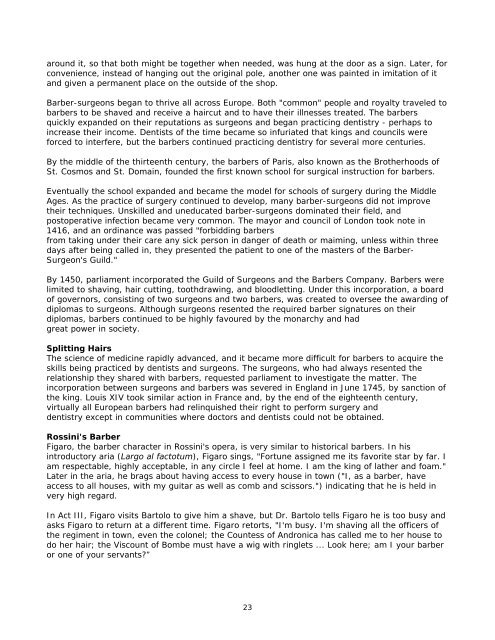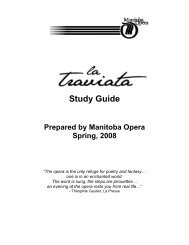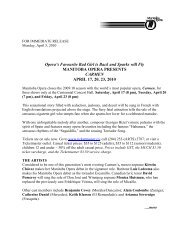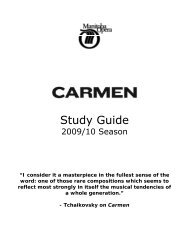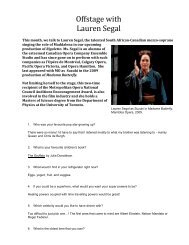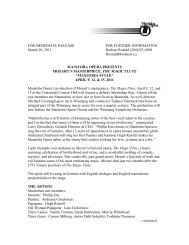The Barber of Seville Study Guide - Manitoba Opera
The Barber of Seville Study Guide - Manitoba Opera
The Barber of Seville Study Guide - Manitoba Opera
Create successful ePaper yourself
Turn your PDF publications into a flip-book with our unique Google optimized e-Paper software.
around it, so that both might be together when needed, was hung at the door as a sign. Later, for<br />
convenience, instead <strong>of</strong> hanging out the original pole, another one was painted in imitation <strong>of</strong> it<br />
and given a permanent place on the outside <strong>of</strong> the shop.<br />
<strong>Barber</strong>-surgeons began to thrive all across Europe. Both "common" people and royalty traveled to<br />
barbers to be shaved and receive a haircut and to have their illnesses treated. <strong>The</strong> barbers<br />
quickly expanded on their reputations as surgeons and began practicing dentistry - perhaps to<br />
increase their income. Dentists <strong>of</strong> the time became so infuriated that kings and councils were<br />
forced to interfere, but the barbers continued practicing dentistry for several more centuries.<br />
By the middle <strong>of</strong> the thirteenth century, the barbers <strong>of</strong> Paris, also known as the Brotherhoods <strong>of</strong><br />
St. Cosmos and St. Domain, founded the first known school for surgical instruction for barbers.<br />
Eventually the school expanded and became the model for schools <strong>of</strong> surgery during the Middle<br />
Ages. As the practice <strong>of</strong> surgery continued to develop, many barber-surgeons did not improve<br />
their techniques. Unskilled and uneducated barber-surgeons dominated their field, and<br />
postoperative infection became very common. <strong>The</strong> mayor and council <strong>of</strong> London took note in<br />
1416, and an ordinance was passed "forbidding barbers<br />
from taking under their care any sick person in danger <strong>of</strong> death or maiming, unless within three<br />
days after being called in, they presented the patient to one <strong>of</strong> the masters <strong>of</strong> the <strong>Barber</strong>-<br />
Surgeon's Guild."<br />
By 1450, parliament incorporated the Guild <strong>of</strong> Surgeons and the <strong>Barber</strong>s Company. <strong>Barber</strong>s were<br />
limited to shaving, hair cutting, toothdrawing, and bloodletting. Under this incorporation, a board<br />
<strong>of</strong> governors, consisting <strong>of</strong> two surgeons and two barbers, was created to oversee the awarding <strong>of</strong><br />
diplomas to surgeons. Although surgeons resented the required barber signatures on their<br />
diplomas, barbers continued to be highly favoured by the monarchy and had<br />
great power in society.<br />
Splitting Hairs<br />
<strong>The</strong> science <strong>of</strong> medicine rapidly advanced, and it became more difficult for barbers to acquire the<br />
skills being practiced by dentists and surgeons. <strong>The</strong> surgeons, who had always resented the<br />
relationship they shared with barbers, requested parliament to investigate the matter. <strong>The</strong><br />
incorporation between surgeons and barbers was severed in England in June 1745, by sanction <strong>of</strong><br />
the king. Louis XIV took similar action in France and, by the end <strong>of</strong> the eighteenth century,<br />
virtually all European barbers had relinquished their right to perform surgery and<br />
dentistry except in communities where doctors and dentists could not be obtained.<br />
Rossini's <strong>Barber</strong><br />
Figaro, the barber character in Rossini's opera, is very similar to historical barbers. In his<br />
introductory aria (Largo al factotum), Figaro sings, "Fortune assigned me its favorite star by far. I<br />
am respectable, highly acceptable, in any circle I feel at home. I am the king <strong>of</strong> lather and foam."<br />
Later in the aria, he brags about having access to every house in town ("I, as a barber, have<br />
access to all houses, with my guitar as well as comb and scissors.") indicating that he is held in<br />
very high regard.<br />
In Act III, Figaro visits Bartolo to give him a shave, but Dr. Bartolo tells Figaro he is too busy and<br />
asks Figaro to return at a different time. Figaro retorts, "I'm busy. I'm shaving all the <strong>of</strong>ficers <strong>of</strong><br />
the regiment in town, even the colonel; the Countess <strong>of</strong> Andronica has called me to her house to<br />
do her hair; the Viscount <strong>of</strong> Bombe must have a wig with ringlets ... Look here; am I your barber<br />
or one <strong>of</strong> your servants?”<br />
23


